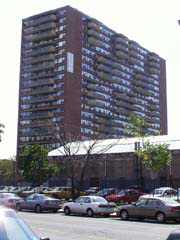Perhaps due in part to election year fears, the City Council turned back an amendment to rent control that had been cleared to go to a referendum.
The council voted unanimously Wednesday to repeal a rent control amendment they had previously approved, a measure which some tenants of a Downtown building had fought for the last half year. Under referendum law, the council has a chance to revisit and repeal an ordinance if it so chose. Tenants of Metropolis Towers (formerly Gregory Park) had argued that their rents would increase dramatically and unfairly under the new rules.
“This should have been dead on arrival the first time,” said Councilman Bob Cavanaugh, who had voted against the change both times.
The mayor’s office and several councilpersons had contended they thought the change to the law was appropriate and fair.
Under the defeated law, former federal Housing and Urban Development-mortgage or HUD-owned buildings – like Metropolis Towers – coming out of bankruptcy would have been subject to a one-time rent increase to market value, and thereafter be placed under rent control. Most observers agreed that the law would have pertained only to Metropolis Towers.
Two weeks ago, the 50 or so tenants involved rejected a settlement offer from majority shareholder George Filopoulos that would have allowed them to stay in their apartments under rent control guidelines or get $5,000 and six months free rent if they chose to leave.
What happens next is anyone’s guess. Filopoulos, who had lobbied the council to enact the amendment, did not return calls seeking comment.
The decision comes after months of legal jostling and public bickering. Shareholders in the building like Irma Colon took to calling the tenants “deadbeats” and argued that the tenants were a financial burden on the co-op. Many tenants were paying relatively low prices on their apartments compared to other apartments in the Downtown area. But the 50 or so rent-payers contended that Filopoulos had illegally raised the rents, and when he was defeated in court, tried to perform an end-around by involving the city in changing the law.
The council in October had voted 6-3 to change the rent law. Quickly after that vote, tenants mobilized to collect signatures to get the matter on the ballot for a public vote. But some residents who had signed the petition later withdrew their names. They felt they had been misled by the petitioners and made to believe that they were signing to stop a wholesale repeal of rent control.
In 1999, Metropolis Towers was on the brink of foreclosure when Filopoulos assumed a portion of the buildings’ $25 million mortgage owed to the federal department of Housing and Urban Development. He also took over 340 of the two buildings’ 770 units as a major “shareholder.” But when he tried to raise rents – some by as much as 200 percent – on the advice of the city’s rent leveling administrator, he got sued.
For now, tenants like Jacquelyn Smith said they will continue paying their rents as currently set. Timing, she said, was crucial. Eight of the nine council members will be seeking election this year, and the political implications may have played a role in the vote.
“We were fortunate that election season was here,” she said.
Zoning changes
When the council met on Monday for its caucus session, it appeared that the massive changes to the zoning laws, approved just last week by the Planning Board, might be in danger. But the mood changed as the week progressed.
The Planning Board had recommended the changes to the council, but not before a coalition of warehouse owners in the would-be artist (WALDO – work and live district overlay) zone Downtown filed a notice of protest over the changes. The notice will force the council to approve the entire document by a two-thirds majority. The council voted unanimously to introduce the zoning Wednesday.
Warehouse owners contended that the zoning unfairly restricted use of the buildings so that only artists and residential tenants could use them, whereas they had the potential to make millions as offices or “cyber-hotels.” The city, in making the change to the zoning, believed the new district would be a place that could “serve to unite the new neighborhoods of the waterfront with the established, historic neighborhoods surrounding the WALDO district.”
The major question mark had been Mariano Vega, the Downtown Councilman often referred to as “The Councilman for the Arts.” He said he still harbored questions about changes to the WALDO area – matters like parking. But the most recent changes to the zoning ordinance require a minimum of one space per every two “dwelling units” constructed, and a maximum of one-and-a-half spaces per every one unit.
While wrangling over WALDO threatened to sink the zoning, a new law meant to restrict development around the Palisade Cliffs got a boost. After the Planning Board decided to leave the so-called “steep slope” changes off the zoning document, the City Council took matters into its own hands by adopting the rule on its own. The city will send the changes to the Planning Board for review.
